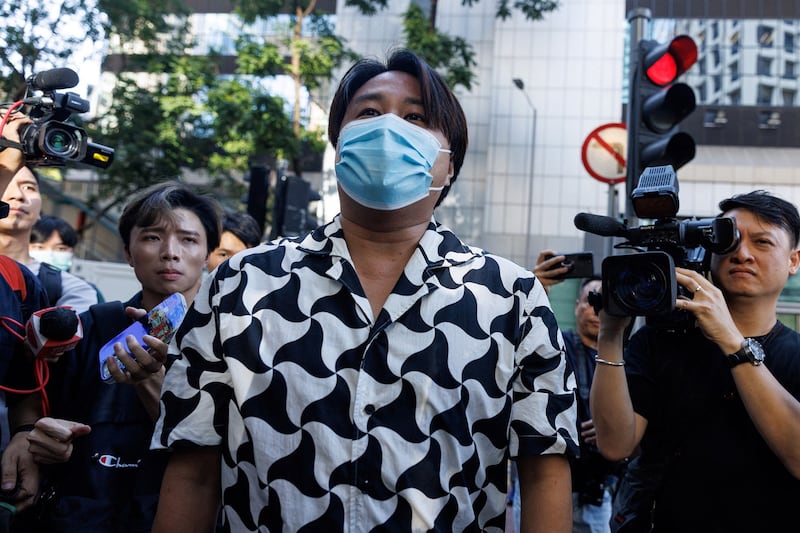National security police in Hong Kong on Monday took away three more family members of exiled pro-democracy activists wanted for "collusion with foreign forces" for campaigning against an ongoing crackdown on dissent in the city.
Police raided the homes of U.S.-based businessman Elmer Yuen's son, daughter-in-law and daughter on Monday, taking them away for questioning on suspicion of "assisting fugitives in continuing to engage in acts that endanger national security."
The raids came after similar actions against the family members of two other exiled pro-democracy activists who, like Yuen, are on a wanted list of eight prominent overseas activists with bounties on their heads.
Police confirmed to Radio Free Asia that they had taken away a man and two women for questioning on Hong Kong Island, but typically don't name those they detain or question.
Later in the day, pro-China lawmaker Eunice Yung told reporters in the Legislative Council that she and her husband Derek Yuen had been taken away for questioning by national security police, who searched their apartment and took away mobile phones and laptops.
"This morning, officers from the National Security Department produced a warrant and searched my home," Yung said. "My husband Derek Yuen and I were taken to the police station for questioning at 7.00 a.m."

While Yung was released after an interrogation that lasted nearly three hours, she said her husband "is still under investigation and I don't know his situation."
Asked if she had told police where to find Elmer Yuen, Yung, who cut off ties with her father-in-law last year, said she didn't know his whereabouts.
"I can say frankly that I don't have any of his details, such as residential address, phone number or any of it," she said. "I fulfilled my civic responsibilities, and I support the national security law."
"I believe I am innocent," she said, adding that she believes her husband will also cooperate with the investigation.
Home raids and bounties
Derek Yuen was later released after around 10 hours of questioning.
Earlier this month, national security police raided the home of trade unionist Mung Siu-tat's brother, taking away him, his wife and son for questioning -- also on suspicion of "assisting fugitives to continue to engage in acts that endanger national security."
Police also took away the parents, brother and sister-in-law of exiled former pro-democracy lawmaker Dennis Kwok and questioned them on suspicion of the same offense. No arrests were made, and all of the activists' family members were released after questioning.
On July 3, national security police issued arrest warrants and offered bounties for U.K.-based Mung, Kwok, Law and five other exiled campaigners, saying they are wanted in connection with "serious crimes" under Hong Kong's national security law.
![“The police aren't going to just take your word for it if you claim [you have severed ties]," says Executive Council member and barrister Ronny Tong. Credit: Bobby Yip/Reuters file photo](https://www.rfa.org/resizer/v2/Y575W5ESUCNAH7RIFSPIUQMZEY.jpg?auth=cf74babf74bcc079e1a755cf9976ba79439213b7f7371df2fd93556176f7b3c2&width=800&height=533)
U.K.-based Finn Lau, Australia-based Ted Hui and Kevin Yam and U.S.-based Anna Kwok and Elmer Yuen are also on the wanted list, with bounties of HK$1 million (US$127,700) offered for information that might lead to an arrest.
The city's leader John Lee has vowed to pursue them "for life."
Executive Council member and barrister Ronny Tong said claims by activists that they have severed ties with family members back home were unlikely to offer much protection from national security police investigations.
"The relationship between you and the wanted suspect has to be investigated – the police aren't going to just take your word for it if you claim [you have severed ties]," Tong said. "A simple claim like that has no effect in law."
Escalation in use of law
But he added that being taken away for questioning doesn't mean somebody broke the law, and is part of a person's civic responsibilities, not an indicator that they have committed any crime.
He said police have a responsibility to fully investigate the cases of the eight overseas activists and try to bring them back to Hong Kong.
The London-based rights group Hong Kong Watch said police also questioned Yuen's daughter Mimi on Monday.
Elmer Yuen is accused of having encouraged foreign countries to impose sanctions on Hong Kong officials and judges, online from the US, and promoting Hong Kong’s self-determination, the group said.
"This is the latest escalation in the application of the Hong Kong National Security Law against opposition figures, in particular since the announcement of arrest warrants and bounties against the eight activists in exile," the group said in a statement in response to Monday's police action.
"This is a drastic escalation since the arrest warrants and bounties against the eight activists and the threats against the families of Nathan [Law], Christopher [Mung] and Dennis [Kwok], which were already outrageous and completely unacceptable," its chief executive Benedict Rogers said.
"The Hong Kong government is openly and increasingly threatening activists abroad, in an attempt to silence them and spread fear among the community. This situation is increasingly similar to that in Mainland China, and we are seeing Hong Kong plummet to this level in terms of human rights, particularly civil and political rights."
Rogers called on governments to protect the rights and freedoms of activists in exile.
Translated by Luisetta Mudie .
